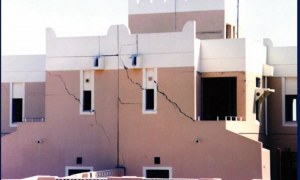🕑 Reading time: 1 minute
Contents:
What is RQD (Rock Quality Designation)?
Rock Quality Designation (RQD) is a measure of quality of rock core taken from a borehole. RQD signifies the degree of jointing or fracture in a rock mass measured in percentage, where RQD of 75% or more shows good quality hard rock and less than 50% show low quality weathered rocks. RFQ is calculated by taking a rock core sample from a borehole and lengths of all sound rock pieces which are minimum 100 mm long are summed up and are divided by the length of the core run. Only those pieces of rocks are considered which are hard and good quality. Weathered rocks which does not meet soundness requirements and whose lengths are not greater than 100mm are not considered for calculation of RQD. The length of core pieces is measured along center line of the pieces. RFQ test provides assessment of soundness of the rock and damages caused due to weathering. Following table shows the values of RQD of various quality of rocks.
Following table shows the values of RQD of various quality of rocks.
Table-1: Quality of rocks and their RQD
| Rock Quality | RQD (%) |
| Very poor (Completely weathered rock) | <25% |
| Poor (weathered rocks) | 25 to 50% |
| Fair (Moderately weathered rocks) | 51 to 75% |
| Good (Hard Rock) | 76 to 90% |
| Very Good (Fresh rocks) | 91 to 100% |
Rocks Core Recovery and RQD Calculations
For calculations of cover recovery and RQD of rocks, check following figure: Core recover is calculated by following formula:
Core recovery (CR) = (total length of rock recovered / Total core run length)x100
There, total length of rock recovered = 250+200+250+190+60+80+120 = 1150mm
Total core run length = 1200mm
Therefore, Core recovery (CR) = (1150/1200)x100 = 96%
Rock quality designation RQD = (SUM(length of sound pieces >100mm)/Total core run length)x100
SUM(length of sound pieces >100mm) = 250+190+200 = 640mm
Therefore, RQD = (640/1200)x100 = 53% which is fair quality rocks, i.e. rocks are moderately weathered.
Core recover is calculated by following formula:
Core recovery (CR) = (total length of rock recovered / Total core run length)x100
There, total length of rock recovered = 250+200+250+190+60+80+120 = 1150mm
Total core run length = 1200mm
Therefore, Core recovery (CR) = (1150/1200)x100 = 96%
Rock quality designation RQD = (SUM(length of sound pieces >100mm)/Total core run length)x100
SUM(length of sound pieces >100mm) = 250+190+200 = 640mm
Therefore, RQD = (640/1200)x100 = 53% which is fair quality rocks, i.e. rocks are moderately weathered.


